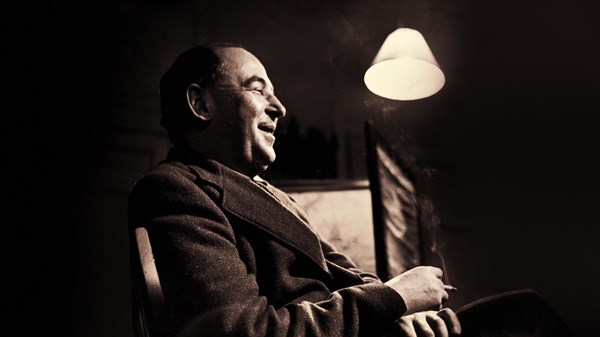C.S. LEWIS
Unusual facts and common misunderstandings that take your knowledge beyond Narnia.
WILLIAM O’FLAHERTY

In honor of the birthday of one of the “patron saints” of contemporary evangelical Christianity, we thought we’d offer up ten surprising facts about Lewis to better understand the beloved British writer (and so you can impress your friends at parties … whenever we can have those again).
If you only know C. S. Lewis because of his books about Narnia, then you don’t know Jack very well! “Jack,” is, of course, the name Lewis went by to his friends. This is just one of the many interesting details about him that are not commonly known. Another is the fact he died on November 22, 1963—the same day that President John F. Kennedy was assassinated. Here are ten more tidbits about Lewis that some might find unusual, or even misunderstand.
1. Famous before Narnia
While Lewis is most known for writing The Chronicles of Narnia, he was famous enough to be on the cover of Time magazine three years before the first tale related to Aslan was published. In 1947, Lewis was the featured story for the September 8 issue of Time. The article on Lewis came out a few months after his latest book, Miracles: A Preliminary Study, was released. The reason for this honor was due to his popularity from his fictionalized correspondence between two demons in The Screwtape Letters. A casual look at the cover reveals this, as you see a pitchforked devil on his left shoulder and the wing of an angel over his head.
2. Married the same woman twice
Most are aware Lewis married Joy Davidman Gresham, but did you know he tied the knot with her twice? The first time was on April 23, 1956, in a civil ceremony. He did it as a friendly gesture to prevent Joy from deportation from England (she was an American). Less than a year later, when it was thought she would soon die from cancer, he married her again at Churchill Hospital on March 21, 1957. So, why do it again? Few actually knew about the first wedding, so it was in part because he wanted to declare his love for her before others. This part of Lewis’s life was the subject of the movie Shadowlands that was first produced by BBC in 1985 and later a Hollywood movie in 1993.
3. Cared for a woman married to another man
Admittedly this headline is a bit sensationalized, but it’s true! As a young man, Lewis made a vow to his friend, Paddy Moore, to care for Moore’s mother if he died. When Paddy was killed in World War I, Lewis made good on his promise and lived with Janie King Moore until just before she died. Moore, though separated from her husband, never divorced; however, it is not as scandalous as you might think. Moore’s daughter, Maureen (the future Lady Dunbar of Hempriggs), lived with them for several of those years. Also, Jack’s brother Warren lived in the same household with them for about two-thirds of the time they lived together. While some would have you believe there had to be a sexual relationship, as Lewis scholar Jerry Root has stated, it is really up to the those who make this claim to prove it.
4. Soldier in WWI and wounded in action
Speaking of WWI, Lewis voluntarily enlisted in the British army in 1917. The above-mentioned Paddy Moore was Lewis’s roommate at Keble College, Oxford, where they both received cadet training. They had met shortly after Lewis joined the Oxford University Officers’ Training Corps on April 30, 1917. On November 17 that year, he went to France as part of his service. He rarely said much about his life as a soldier, and so few of his experiences are known. We do know that he was hospitalized with pyrexia in February 1918, and two months later he was wounded on Mont-Bernanchon (near Lillers, France) during the Battle of Arras.
5. Wanted to be a poet
It’s no secret Lewis enjoyed writing, but his original passion was poetry. In 1919, before his 21st birthday, his first book, Spirits in Bondage: A Cycle of Lyrics, was published. Nearly all of the book was written when he was 16 or 17 years old. During that time, Lewis didn’t believe in God, and the material reflects that perspective. The book did not sell many copies. His next poetry book, Dymer, came out in 1926 and also did not sell well. While he never published a new book of poems during his lifetime, he did continue to write them and quite a few were released in a variety of publications during his lifetime. There were so many of them that less than a year after his death, Walter Hooper edited a collection simply called Poems.
6. Wrote three books under different names
Can you imagine Lewis not taking credit for books he wrote? While it may be difficult to consider, it’s true. Early in his career, his first two books of poetry, Spirits in Bondage and Dymer, were both credited to Clive Hamilton (Clive is his actual first name and Hamilton is his mother’s maiden name). Then, before he died, A Grief Observed was published (in 1961) under the pseudonym N. W. Clerk. That book recounts some of the sorrow Lewis experienced after the death of his wife. It was republished the year after his own death with him identified as the author.
7. Taught philosophy before English
While some are aware Lewis’s first full-time job was teaching English literature at Oxford University, far fewer know he had a temporary position (1924–25) as teacher of philosophy at Oxford. One of his degrees from Oxford was Literae Humaniores, which involves the study of classics, philosophy, and ancient history, which qualified him for the short-term post. In fact, he even applied for a philosophy position at Trinity College, Oxford (but failed to get it). The short-term position he did secure at University College, Oxford, was to teach during the absence of Edgar Frederick Carritt (who was Lewis’s tutor in philosophy). Carritt was on leave to teach at the University of Ann Arbor, Michigan.
8. Never was a professor at Oxford
As noted already, Lewis did teach at Oxford. While he taught there for 30 years, he was never given the title of Professor. Instead, he was merely a “don.” What’s the difference? A don in the UK is one who is a “tutor” or “lecturer” of a particular subject. A professor is often the head of a department and has a more flexible schedule. Less than ten years before his death, Lewis accepted a professorship of medieval and Renaissance English at Cambridge University.
9. Tolkien was instrumental in Lewis getting Cambridge position
Lewis was appointed to his professorship at Cambridge on October 1, 1954 (he officially began it on January 1, 1955). Ironically, even though the position was created for him, Lewis initially showed very little interest in it. His friends J. R. R. Tolkien, E. M. W. Tillyard, F. P. Wilson, and Basil Willey all played a role in Lewis getting the position, but Tolkien deserves special mention. As Alister McGrath recounts in C. S. Lewis: A Life: Eccentric Genius, Reluctant Prophet, after Lewis had twice declined the offer to teach at Cambridge, Tolkien wouldn’t let the matter go. He sought clarification from Lewis about why he refused the offer. Lewis thought he would have to move from his home of over two decades and live in Cambridge. This was not so, and thanks to not one but two letters written by Tolkien, the issue was settled. Or, at least everyone thought it was; unfortunately, Cambridge offered the position to their second choice before Lewis contacted the university. Fortunately, that person declined, and Lewis took the position when it was offered to him a third time.
10. Lewis’s encouragement helped get the Lord of the Rings published
Why was Tolkien so willing to help Lewis obtain the position at Cambridge? As you may have heard, they were friends from Lewis’s early days at Oxford. But did you know they were so close that Lewis actually read a version of The Hobbit about five years before it was published? He told his friend Arthur Greeves about it in a letter from 1933: “Since term began I have had a delightful time reading a children’s story which Tolkien has just written.” Not long after the book came out in 1937, Tolkien’s publisher wanted a sequel. As Diana Glyer recounts in Bandersnatch, Tolkien initially declined but eventually reconsidered. Early chapters of the sequel were shown to Lewis on March 4, 1938. Lewis gave feedback to Tolkien that he took to heart, which led to the rewriting of the first three chapters. As you might recall, The Lord of the Ringswas not published until the 1950s, but few know that, had it not been for Lewis, it might never have seen the light of day. Tolkien wrote in his letters about Lewis, “I owe to his encouragement the fact that … I persevered and eventually finished The Lord of the Rings.”
William O’Flaherty is an in-home family therapist, author, and creator of the website essentialcslewis.com and the YouTube channel 90 Seconds to Knowing C.S. Lewis. His latest book is The Misquotable C. S. Lewis: What He Didn’t Say, What He Actually Said, and Why It Matters (Wipf and Stock, 2018).

Our world would be poorer without two other worlds: Narnia and Middle-earth. Yet if two young professors had not met at an otherwise ordinary Oxford faculty meeting in 1926, those wondrous lands would still be unknown to us.
British author Colin Duriez, who wrote the article “Tollers and Jack” in issue #78 of Christian History, explains why this is so in his forthcoming book Tolkien and C. S. Lewis: The Gift of Friendship. Duriez tells the story of how these two brilliant authors met, discovered their common love for mythical tales, and pledged to bring such stories into the mainstream of public reading taste. Tolkien and Lewis shared the belief that through myth and legend—for centuries the mode many cultures had used to communicate their deepest truths—a taste of the Christian gospel’s “True Myth” could be smuggled past the barriers and biases of secularized readers.
Christian History managing editor Chris Armstrong reached Colin this week at his home in Leicester, England.
You have said that if it hadn’t been for the friendship between Tolkien and Lewis, the world would likely never have seen The Narnia Chronicles, The Lord of the Rings, and much else. What was it about “fairy stories” that led these two men to want to rehabilitate them for a modern audience—adults as well as children?
They had both personal and professional reasons for this interest. Personally, they had both read and enjoyed such stories as they were growing up, in collections by the brothers Grimm, Andrew Lang, and others. Lewis had also heard Celtic myths—his nurse had told him some of the folk tales of Ireland.
Professionally, they studied and taught the literatures of medieval romance and, …
Dorothy L. Sayers once described G. K. Chesterton as a kind of “Christian liberator” who blew into the church “gusts of fresh air, in which the dead leaves of doctrine danced with all the energy and indecorum of Our Lady’s Tumbler.” Sayers’s comment comes very near the mark in capturing the role C. S. Lewis has played since Chesterton’s death in 1936. Like Chesterton before him, to the English-speaking church Lewis has been nothing less than a Christian liberator.
As early as 1942, C. S. Lewis was already a bestselling author. In 1947, he was heralded as “one of the most influential spokesmen for Christianity in the English-speaking world” by Time magazine, which featured his picture on the front cover. “With erudition, good humor and skill,” the Time article proclaimed, “Lewis is writing about religion for a generation of religion-hungry readers brought up on a diet of ‘scientific’ jargon and Freudian clichés. … [He] is one of a growing band of heretics among modern intellectuals: an intellectual who believes in God … not a mild and vague belief, for he accepts ‘all the articles of the Christian faith.'”
The article attributed much of Lewis’s remarkable success to his “talent for putting old-fashioned truths into a modern idiom” and giving “a strictly unorthodox presentation of strict orthodoxy.” Three years earlier, The Times Literary Supplement had already suggested something similar: “Mr. Lewis has a quite unique power of making Theology attractive, exciting and (one might almost say) an uproariously fascinating quest.”
But Lewis, like Chesterton, made the dead leaves of doctrine .
In The Voyage of the Dawn Treader, one of the Narnia series, Eustace, a factual-minded, thoroughly modern boy, meets a fallen star named Ramandu. On hearing that Ramandu is a star, Eustace says, “In our world, a star is a huge ball of flaming gas.” Ramandu replies, “Even in your world, my son, that is not what a star is but only what it is made of.”
This distinction between scientia (knowledge, the makeup of things) and sapientia (wisdom, the significance of things) informed all of Lewis’s writings, especially his fiction. Except for a brief period as an undergraduate when he tried to adopt modernist skepticism, Lewis spent his life pursuing wisdom. The pursuit led him to the philosophy of Plato and Wordsworth, but he also practiced the common sense Christianity of Samuel Johnson. Even though Lewis was a Platonist, he did not often talk of the visible world as a mere shadow of the real. In Letters to Malcolm, he says, “In fact we should never ask of anything ‘Is it real?,’ for everything is real.” We may think of our world as a stage set, but it is a real stage set. Because he thought everything was real, Lewis could create imaginary worlds with gusto.
The good, the bad, and the ghostly
In his worlds, missing reality is the prime error. It happens in two ways: either to focus completely on facts and miss significance, or to become self-centered and miss the real beauty of creation. In Lewis’s stories, the good people either possess or acquire the ability to touch reality, while the bad people are entangled in illusion. Like the inhabitants of Dante’s hell, they lack the good of the intellect.
Lewis’s fiction was based on his approach to reality from the beginning, .
He was an imaginative Belfast Irishman, in whom a cultivated Oxford accent replaced his father’s oratorical brogue, and for whom Oxford was home.
He was a brilliant expositor and debater, whose powers of logical analysis, bright brisk narrative, and vivid illustration were stunning.
He was a heavyweight academic with a self-possessed forthrightness that unnerved some of his students. He worked hard and expected others to do the same. Woe to you if Lewis was your tutor and you were lazy!
He was a teacher of literature who seemed to have read all the literature there was in English and Europe’s other main languages. He was once called the best-read man of his generation. He wrote effortlessly and brilliantly.
He was somewhat eccentric, careless about clothes and home comforts and quixotically meticulous in keeping promises and observing routines. In his fifties, he enjoyed three years of great happiness married to a crippled Jewish divorcée from America.
His clubbable, booming jollity masked shyness; his schoolboy humor masked seriousness; and his reading, teaching, writing, and endless dialectics masked a longing for deep and close relationships. “You’ll never get to the bottom of him,” his friend J. R. R. Tolkien once said.
Such was Clive Staples Lewis, “Jack” to his friends, fellow of Magdalen College, Oxford, from 1925 to 1954, and professor of medieval and Renaissance literature at Cambridge from 1954 to 1963, who died of kidney failure on November 22, 1963, a week from his 65th birthday. It was the day Kennedy was shot.
He had become a clear-headed Christian in 1931, after almost two decades of professed atheism—that is, of denying all the realities of the .
By:http://www.christianitytoday.com























2 Responses
I am currently writing a paper and a bug appeared in the paper. I found what I wanted from your article. Thank you very much. Your article gave me a lot of inspiration. But hope you can explain your point in more detail because I have some questions, thank you. 20bet
Your article helped me a lot, is there any more related content? Thanks!